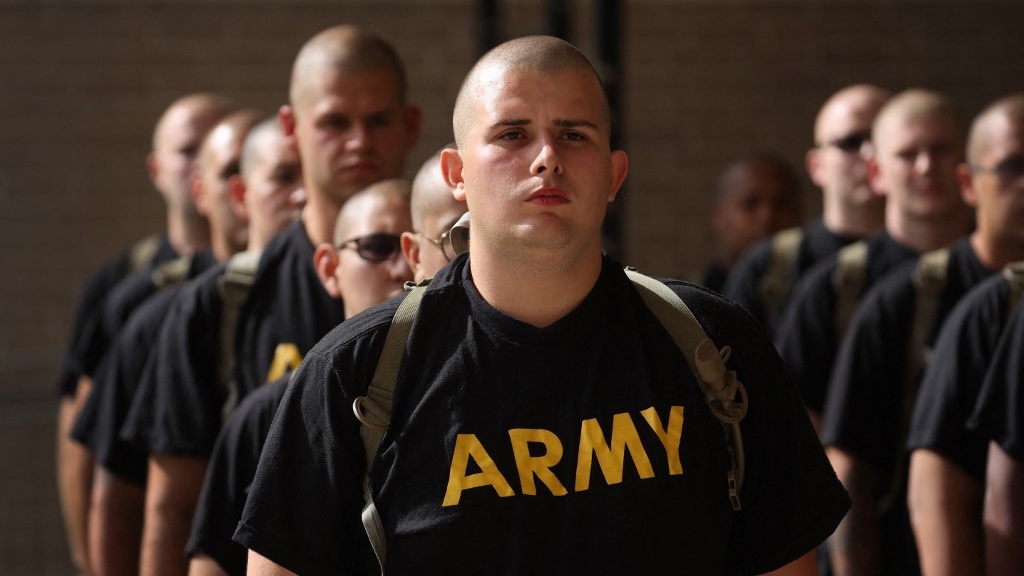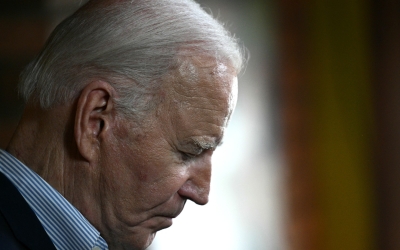Why the US and UK are facing a military recruitment crisis

We are in a “prewar era”. That was the message from Polish Prime Minister Donald Tusk in a recent speech. It was not an original thought; in fact, Tusk was late to the choir.
In January, UK Defence Secretary Grant Shapps delivered a watershed Lancaster House speech, in which he announced that Europe was no longer in a postwar but a prewar situation. The head of the British army has been singing the same hymn.
But amid all the talk of a new European war, the political establishments in the UK and US face an enormous problem: in neither country can the armed forces attract sufficient young people to meet the demands of the military. The British army is now the smallest it has been since 1714.
In the UK, the recruitment crisis is so acute that senior military figures, backed by former Prime Minister Boris Johnson, are calling for the reintroduction of conscription.
If any such effort were to make it off the pages of the Tory media and into the statute books, the conscription drive would face some very real problems. A recent YouGov poll showed that young people have a very pronounced aversion to military service.
Stay informed with MEE's newsletters
Sign up to get the latest alerts, insights and analysis, starting with Turkey Unpacked
The poll asked 18- to 40-year-old respondents whether they would be willing to serve in the army if a new world war broke out. Only seven percent said they would volunteer, while 21 percent said they would serve if conscripted. A total of 38 percent said they would refuse to serve even if conscripted. That’s a lot of “draft dodgers”.
More surprisingly, even if the country were facing imminent invasion, a full 30 percent said they would refuse to serve even if conscripted.
Targets missed
Short of conscription, it’s not surprising that the armed forces face a problem. In the 12 months to March 2023, intake for the Royal Navy and Royal Marines dropped 22 percent from the previous year, while in the Royal Air Force it dropped by almost 17 percent and the army by nearly 15 percent. Despite government plans to reduce the size of the army, these figures are still well below targets.
In fact, army and navy recruitment figures have failed to hit their targets every year since 2010. The navy is even decommissioning ships, including the HMS Westminster and HMS Argyll, because there are not enough sailors to crew them.
If conscription were implemented, it would likely repeat the pattern of voluntary recruitment: the poor would do the fighting and the rich would stay at home.
It is surely a sign of empire in decline that these nations can no longer attract people willing to take up arms on their behalf
In England, from 2013 to 2018, army recruitment of 16- and 17-year-olds was 57 percent higher in the poorest fifth of constituencies than the richest fifth. Army recruiters tend to focus on the poorest towns and cities, particularly families with an annual income of around £10,000 ($12,500), according to a 2019 report from the Child Rights International Network.
And joining the army is no route to riches. Pay rises were capped at one percent between 2013 and 2018. While there has been an uptick in the last two years, at 3.75 percent in 2022/23 and five percent plus a £1,000 ($1,250) bump in 2023/24, pay has still fallen well below increases in the cost of living. In addition, a lot of military housing is substandard.
The picture is no different in the US. Armed forces recruitment is slumping, and the US now has its smallest military in 80 years. In 2022, the US armed forces had their worst recruitment since the draft was abolished in 1973. A recent Gallup poll found that confidence in the US military, at 60 percent, was at its lowest level in more than two decades.
All of this has caused panic in the political establishment. Former British Defence Secretary Ben Wallace blames Generation Z for not being willing to fight in the way previous generations were. The Economist thinks the fallout from the Covid-19 pandemic is part of the problem. The Telegraph argues that amid trendy diversity policies, “white men no longer want to fight for a nation that scorns them”. The Times believes that strict rules on tattoos are cutting into recruitment.
Declining confidence
A more robust look at the causes of low recruitment comes from Matthew Gault of Vice, who says the biggest reason for falling confidence in the military “is the end of the war in Afghanistan, the American withdrawal from it and how quickly the Taliban was able to retake it. There was a lot of really bad optics, there’s a lot of terrible footage, a lot of horrifying stories that happened in the immediate wake of that. And when America loses a war, confidence in the military goes down.”
In the UK, a former member of the Parachute Regiment, Richard Mitchell, told the Guardian the same story. He joined after the 9/11 attacks, when “they couldn’t get people into the Para depot fast enough”. But “Iraq was exposed as the big lie, and Afghanistan as a complete failure. Young people look back on recent history and worry the same will happen again.”
In a 2022 US poll of people aged 16-24, respondents were asked how likely they were to join the military in the next few years. Just two percent said “definitely” and seven percent “probably”, while 90 percent said they definitely or probably would not. Fear of death, injury and PTSD were among the most-cited reasons for being unwilling to serve.
Beyond imperial demoralisation, there is the state of healthcare and education in the US. The Pentagon in 2020 estimated that only around 23 percent of people aged 17 to 24 met the standards for the military, down from 29 percent in 2016. And amid the computerised warfare of the 21st century, the military is simply unable to attract enough computer literate recruits.
Then there is the wider disconnect between the elites and the military, and wider society. Take the case of Alabama Senator Tommy Tuberville, who sits on the Senate armed services committee. For months, he blocked hundreds of military promotions over concerns about the US Defence Department’s commitment to ensuring that service members have access to abortion procedures.
In the UK, sexism and harassment have been reported everywhere from the Red Arrows to submarine crews and the defence ministry itself. In the US, fear of sexual harassment or assault is among the top 10 reasons why people are unwilling to join the military.
It is surely a sign of an empire in decline that these nations can no longer attract people willing to take up arms on their behalf. If that is the case, the US and UK are facing an acute crisis of decline.
The views expressed in this article belong to the author and do not necessarily reflect the editorial policy of Middle East Eye.
Middle East Eye delivers independent and unrivalled coverage and analysis of the Middle East, North Africa and beyond. To learn more about republishing this content and the associated fees, please fill out this form. More about MEE can be found here.






